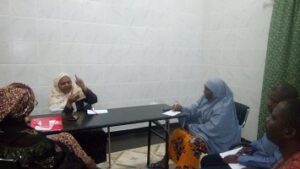
By Joseph Edegbo:
Worried by the stockout of family planning commodities in Kaduna State, Northwest Nigeria, an Advocacy Group, Family Health Advocates in Nigeria Initiative is seeking ways towards arresting the syndrome.
The stockout which started in the middle of last year across the country has affected negatively the percentage of women taking the service in Kaduna State from 24% to 12% – the survey was conducted by National Bureau of Statistics (NBS) and released early this year.
Leading some members of FHANI and officials of Planned Parenthood Federation of Nigeria (PPFN) on advocacy visit to Executive Secretary, Kaduna State Health Supplies Management Agency, Ramatu Abdulkadir, the Ag. Secretary of FHANI, Iliya Kure sought to know the possible way out, in view of her expertise.
He said even though the Federal Government had agreed to assist Kaduna under an emergency plan, one wonders what would happen after that was emergency support.
Responding, the Executive Secretary who acknowledged the advocacy visit, observed that the stockout situation was a fundamental problem arising from the Supply Chain and not money.
Hajiya Ramatu who decried the fire brigade approach of doing things in Nigeria, stressed the need for Stakeholders to look at the root cause and why the Federal government was buying the Commodities, with a view to finding sustainable solution.
Kaduna State, through the Health Supplies Management Agency, she said, has all it takes to solve the problem by building a complete Supply Chain for the country.
The Executive Secretary therefore called for a high-powered delegation of Stakeholders to convince Federal authorities to align with the Kaduna State Government in that regard for sustainability.
Meanwhile, arrangements are being made to take delivery of the emergency Supplies of the Commodities approved for the State by the Federal Government.
The Reproductive Health Coordinator, in the State Primary Health Care Development Agency, Nafisa Isa disclosed this during an advocacy visit by FHANI.

She said the State was prompted to put up the request because of the importance attached to Family Planning pending the normal supply.
Hajiya Nafisa also disclosed that the State had applied to the Federal government to make direct purchase of the Commodities as against the present practice, where it falls within the powers at the centre through the United Nations Population Fund.
The move, she said, was the outcome of a meeting with CSOs, Development partners and other stakeholders with who government had been working closely looking into problems associated with the implementation of the programme including the inadequate Supply of Reproductive Health Commodities.